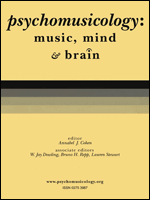
Psychomusicology
Scope & Guideline
Innovating Research on the Cognitive Effects of Music
Introduction
Aims and Scopes
- Music Cognition and Perception:
Research in this area examines how individuals perceive and process musical elements, including pitch, rhythm, and melody, and their implications for cognitive functions. - Emotional and Psychological Effects of Music:
This scope investigates how music impacts emotions, mood regulation, and psychological well-being, highlighting the therapeutic potential of music in mental health. - Music and Social Interaction:
Publications often explore how music facilitates social bonding and communication, particularly in contexts like joint improvisation and cultural exchanges. - Neuroscience of Music:
This area focuses on the neural underpinnings of musical experience, assessing the brain’s response to music and its relation to other cognitive and emotional processes. - Educational Applications of Music:
Research includes examining the role of music in education, particularly in relation to music pedagogy and the development of musical skills. - Individual Differences in Music Preference:
Studies analyze how personal traits, such as personality and musical sophistication, influence music preferences and experiences.
Trending and Emerging
- Music and Mental Health:
A growing body of research focuses on the therapeutic effects of music on mental health, particularly among adolescents and young adults, indicating a societal trend towards recognizing music's role in emotional well-being. - Technology and Music Interaction:
There is an increasing exploration of how technology, including apps and digital platforms, influences music engagement and emotional responses, reflecting the digital transformation of music consumption. - Cross-Cultural Music Studies:
Recent studies emphasize the importance of cross-cultural perspectives in understanding music's role in emotional responses and social behaviors, showcasing a trend towards globalization in music research. - Neuroscientific Approaches to Music:
Emerging methodologies, such as neuroimaging, are increasingly applied to understand the cognitive processes involved in music perception and production, indicating a trend towards more empirical and biological perspectives in music research. - Music and Cognitive Functions:
Research is increasingly linking musical engagement with cognitive functions such as executive control and memory, exploring how music can serve as a tool for cognitive enhancement.
Declining or Waning
- Traditional Musicology:
There is a noticeable decline in studies centered solely on traditional musicology, as the journal shifts more towards interdisciplinary approaches that integrate psychology and cognitive science. - Atonal and Experimental Music Studies:
Research specifically focused on atonal music and avant-garde styles has decreased, possibly as interest shifts towards more universally relatable music experiences and their psychological impacts. - Music and Physical Performance Studies:
Papers that solely explore the physical aspects of music performance, such as technical execution without cognitive or emotional context, are becoming less frequent.
Similar Journals
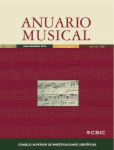
Anuario Musical
Elevating the discourse in Music and Arts.Anuario Musical, with its ISSN 0211-3538 and E-ISSN 1988-4125, is a prestigious journal in the fields of Music, Visual Arts, and Performing Arts, published by CONSEJO SUPERIOR INVESTIGACIONES CIENTIFICAS-CSIC in Spain. Since becoming an Open Access journal in 1995, it has played a crucial role in disseminating cutting-edge research and fostering scholarly communication in these dynamic disciplines. The journal has achieved notable rankings in the 2023 category quartiles, being placed in Q2 for Music and Q1 for Visual Arts and Performing Arts, reflecting its commitment to high-quality scholarship. Furthermore, it is indexed in Scopus with respectable ranks—#294/667 in Visual Arts and Performing Arts and #105/180 in Music—underscoring its relevance in the global academic landscape. Between 2011 and 2023, Anuario Musical has published a diverse range of articles that contribute significantly to the understanding and appreciation of music and the arts, making it an essential resource for researchers, professionals, and students alike. For more details, the journal is based at Editorial CSIC, C/VITRUVIO 8, 28006 MADRID, SPAIN.
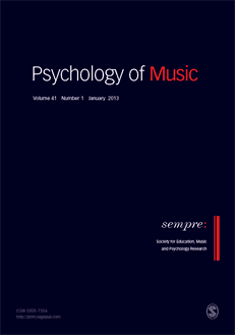
Psychology of Music
Bridging Minds and Melodies for Deeper UnderstandingPsychology of Music is a prominent academic journal published by SAGE Publications Inc, focusing on the interdisciplinary field that bridges psychological principles and musical expression. Established in 1973, this esteemed journal plays a crucial role in advancing understanding of how music affects emotions, cognition, and social interactions, thus catering to a diverse audience of researchers, educators, and practitioners in both psychology and music. With an impressive impact factor that places it in the Q1 category for Music and Q2 for Psychology (miscellaneous) in 2023, this journal ranks 3rd out of 180 in Arts and Humanities – Music, and 19th out of 97 in Psychology (miscellaneous) according to Scopus metrics, affirming its authoritative contribution to the field. The Psychology of Music is essential for those looking to explore cutting-edge research, methodologies, and applications, providing rich insights and fostering discussions that reach into music therapy, education, and psychological wellness. Although it is not an open-access journal, its high-quality peer-reviewed articles are pivotal for anyone dedicated to the intricate relationship between music and the mind, making it a must-read for professionals and students alike.
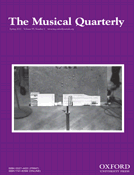
MUSICAL QUARTERLY
Advancing Musicology Through Critical DiscourseMUSICAL QUARTERLY, published by Oxford University Press Inc, is a distinguished journal in the field of music, with a publication history that stretches back to 1915. This esteemed journal, identifiable by its ISSN 0027-4631 and E-ISSN 1741-8399, provides a critical platform for scholarly discourse, analysis, and research in musicology and related disciplines, facilitating an understanding of both historical and contemporary musical practices. Although it operates without open access, it continues to attract a diverse readership of researchers, educators, and students alike, thanks to its well-curated articles and reviews that engage with music theory, history, and ethnomusicology. With a current Scopus rank of #119 out of 180 in the Arts and Humanities category and a 34th percentile ranking in Music, MUSICAL QUARTERLY plays a vital role in advancing knowledge and fostering collaboration within the music academic community. Its commitment to high-quality scholarship is reflected in its ongoing efforts to address the evolving landscape of music studies, making it an essential resource for anyone serious about exploring the rich tapestry of music scholarship.

MUSICAL TIMES
Cultivating Scholarly Excellence in MusicologyMUSICAL TIMES is a distinguished journal dedicated to the exploration and dissemination of scholarly works in the realm of music, serving as an essential resource for researchers, professionals, and students alike. Published by MUSICAL TIMES PUBLICATIONS LTD, this journal has built a robust reputation within the arts and humanities, specifically focusing on music studies, with an impactful reach indicated by its Scopus ranking at #73 out of 106 in the field. Though access to this journal is not open, its curated content, which spans various facets of musicology and contemporary music discourse, enriches the academic community by encouraging insightful discussions and critical analyses. With its historical roots tracing back to its inception, MUSICAL TIMES aims to foster a deeper understanding of music's cultural, social, and artistic dimensions, making it a valued publication for those engaged in the scholarly pursuit of music.

Information and Communication Technology in Musical Field
Illuminating the Digital Symphony of Modern MusicInformation and Communication Technology in Musical Field is an esteemed academic journal published by MEDIA MUSICA, dedicated to exploring the intersections of technology and music. With an ISSN of 2067-9408 and an E-ISSN of 2069-654X, this journal serves as a vital resource for researchers, professionals, and students interested in the latest advancements and applications of information and communication technologies within the musical sphere. While specific impact factor metrics are currently unavailable, the journal aims to provide a platform for high-quality research that fosters innovation in music production, distribution, and theory. The implications of technology in music are profound, influencing everything from composition to performance and consumption, and this journal strives to illuminate these transformative changes. Located in Cluj-Napoca, Romania, at STR ICBRATIANU NR 25, this publication encourages submissions that contribute to the diverse dialogue surrounding music and technology, ensuring that it remains an essential reference for those at the forefront of this dynamic field.

OR SPECTRUM
Advancing Knowledge in Management and Operational ExcellenceOR SPECTRUM, published by SPRINGER, is a premier journal in the fields of Business, Management, and Operations Research, with a distinguished reputation established since its inception in 1979. As of 2023, it holds an impressive Q1 ranking in Business, Management and Accounting (miscellaneous) and a Q2 ranking in Management Science and Operations Research. The journal, which is indexed under ISSN 0171-6468 and E-ISSN 1436-6304, boasts a significant impact factor within its scope, making it a pivotal resource for cutting-edge research and theoretical developments. With access options that favor traditional subscriptions, OR SPECTRUM offers a robust platform for the dissemination of innovative ideas and methodologies, vital for academics, professionals, and students alike. The journal's commitment to excellence ensures its critical role in enhancing the understanding and application of operational research techniques around the globe.
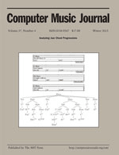
COMPUTER MUSIC JOURNAL
Fostering Scholarly Dialogue in Music and TechComputer Music Journal, published by MIT Press, stands as a prominent platform for scholarly discourse in the intersection of music and technology. With its origins dating back to 1982, the journal spans an extensive range of topics, from computer-generated music and sound synthesis to interactive musical systems and multimedia art. Despite not being an open-access journal, it has garnered significant recognition, reflected in its rankings across various fields—placing 22nd in Music within Arts and Humanities and achieving a Q2 category status in Music for 2023. This publication is invaluable for researchers, practitioners, and enthusiasts alike, offering critical insights that expand the boundaries of musical composition and technological innovation. With its robust history and commitment to advancing the understanding of computer music, the Computer Music Journal continues to be a critical resource in both the academic and artistic communities.

Problemy Muzykalnoi Nauki-Music Scholarship
Unveiling the Richness of Musical ResearchWelcome to Problemy Muzykalnoi Nauki-Music Scholarship, a leading journal in the field of music scholarship published by the esteemed Gnesin Russian Academy of Music. With an ISSN of 2782-358X and an E-ISSN of 2782-3598, this Open Access journal has been committed to the dissemination of high-quality research since 2009, making scholarly work accessible to a global audience. Covering diverse aspects of music theory, history, and its socio-cultural impacts, Problemy Muzykalnoi Nauki serves as an essential platform for scholars, educators, and practitioners in the arts and humanities, as well as in social sciences related to music education. While its Scopus coverage was discontinued in 2021, the journal remains influential, holding a rank of #48 in the Arts and Humanities category and a percentile of 67th, showcasing its relevance and rigor in the discipline. We invite researchers and students alike to explore the rich contributions made within these pages, fostering a deeper understanding and appreciation of music in contemporary society.
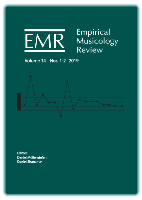
Empirical Musicology Review
Bridging Theory and Practice: Where Musicology Meets MethodologyEmpirical Musicology Review is a pioneering journal in the field of musicology, published by the Ohio State University School of Music. Established as an open access journal since 2006, it aims to foster interdisciplinary research by providing a platform for scholars to disseminate empirical studies and analyses related to music. With ISSN 1559-5749, this journal plays a crucial role in expanding the understanding of music through methodological rigor and innovative practices, catering to researchers, professionals, and students alike. By promoting the accessibility of high-quality research, Empirical Musicology Review significantly contributes to the evolving landscape of music studies and enhances the global dialogue surrounding music's theoretical and practical dimensions. The journal's commitment to open access ensures that its valuable insights reach a broad audience, encouraging further exploration and collaboration within the musicology community.
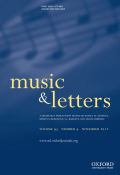
MUSIC & LETTERS
Fostering Scholarly Conversations in MusicologyMUSIC & LETTERS, published by Oxford University Press, is a prominent academic journal that has been at the forefront of musicology and music studies since its inception in 1920. With an ISSN of 0027-4224 and an E-ISSN of 1477-4631, the journal provides a platform for scholarly articles that explore the rich interplay between music and literature, contributing significantly to the understanding of musical context, form, and societal impact. As of 2023, it holds a respectable Q3 rank in Music within its category, positioned at Rank #66 out of 180 in the Scopus Arts and Humanities Music category. Despite not being an Open Access journal, its rigorous peer-review process and commitment to high-quality research make it an essential resource for researchers, professionals, and students alike. The journal's scope encompasses various genres and historical periods, ensuring a comprehensive examination of music's role in culture and community, thereby enhancing the scholarly discourse within this vibrant field. Based in the United Kingdom, at Great Clarendon St, Oxford OX2 6DP, England, MUSIC & LETTERS continues to inspire and inform the global music scholarly community.